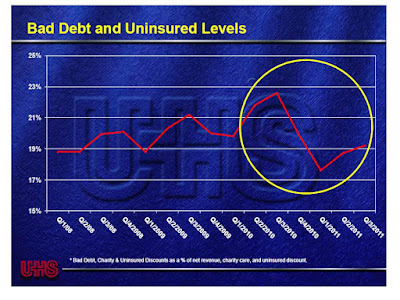"I don't want to make black people's lives better by giving them somebody else's money; I want to give them the opportunity to go out and earn the money."-- Rick Santorum in Iowa
Ex-Senator Rick Santorum served on the board of Universal Health Services, a for-profit hospital company for four years. Santorum resigned when he announced his Presidential run in June 2011.
Oddly, UHS' payor mix shows Uncle Sam at 46% of acute care and 57% of behavioral health revenue.
Roughly half of UHS' business comes via Medicare and Medicaid, i.e. other people's money.
As more Americans struggled to keep health insurance coverage, UHS drove down charity care and bad debts by five percentage points, a drop of nearly 25%. This occurred while Rick Santorum provided board oversight.
UHS' stinginess on charity care likely meant a greater burden for safety net providers. I noted this nearly two years ago. My point made UHS' investor presentation:
Recently UHS inked a deal to acquire a South Texas nonprofit, community hospital. The Monitor reported:
Selling the community hospital will prevent a "slow death" caused by government cuts to Medicaid and Medicare reimbursement rates and competition from surrounding hospitals with more resources to draw upon, said John Lackey, the chair of the hospital board that approved the sale. Although Knapp’s board expects the hospital to turn a small profit this year, he said, it will become increasingly difficult in the future.
"The ability for a standalone community hospital to compete with the big guys to either side of us is coming to end," Lackey told the council. "We’re trying to do what’s right for the hospital and our community."
Weslaco City Council and area physicians declared war on UHS, which owns seven hospitals in South Texas. UHS devoted three slides in its latest investor presentation to the South Texas market.
Ironically, this area was the focus of a New Yorker piece cited by President Obama as foundational to health reform. The President ignored the Mayo Clinic's outstanding performance, achieved by unleashing clinicians' intrinsic motivation. Obama's team chose the extrinsic motivation model, espoused by the UHS' of the world.
UHS' growth in 2011 is impressive, but leverage could come back to haunt. How much did UHS' interest expense rise in the last year? Interest expense rose over $120 million, an increase of 333%. It's another clue healthcare costs aren't going down under dealmakers.
Rick Santorum sides with the monied and he's not alone. It's a Red and Blue affair. As Santorum noted, it's mostly white as well. All for the green...
Update 1-4-12: Santorum stated he said "blah" people vs. "black" people. So that's how they got enough k's to form the KKK..
Update 1-29-12: Forbes noted how Red and Blue love PEU's..




